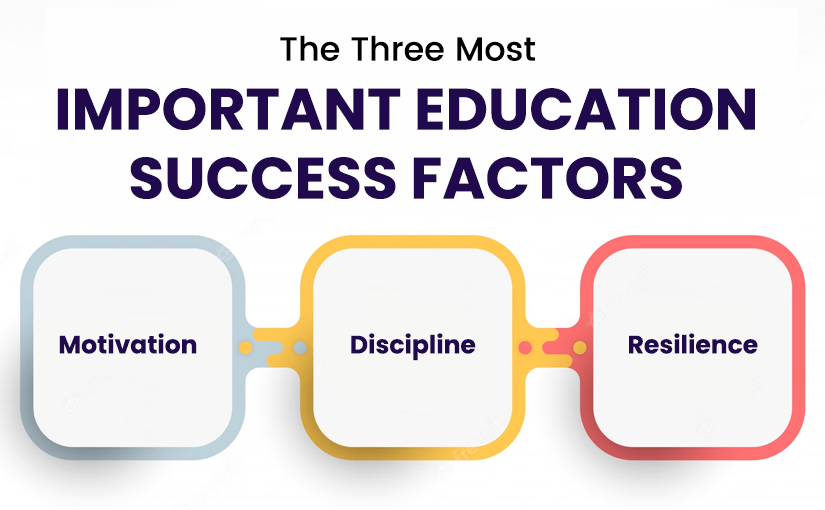Our future is significantly shaped by education, which is an important aspect of our lives. We can acquire knowledge and skills through education, but it also equips us with the tools we need to face challenges in the real world and make wise decisions. However, achieving academic success is not always simple, and there are a number of factors that affect a student’s success.
In this blog, we will discuss the three key education success factors that can support students in achieving academic success.
Motivation
Students need motivation in order to succeed in their academic endeavours. Extrinsic motivation, which derives from outside elements like rewards, recognition, and encouragement, can also come from within the student. Since intrinsic motivation is driven by a sincere interest in the subject and a desire to learn, it is more enduring and effective than extrinsic motivation. Intrinsically motivated students are more likely to enjoy the learning process, set higher goals, and put in more effort to reach those goals.
By fostering a positive learning environment that promotes curiosity, exploration, and self-discovery, teachers can encourage intrinsic motivation in students. Additionally, they can give students the chance to pursue their interests and passions, include practical activities and real-world projects, and provide supportive feedback. Additionally, teachers can assist students in creating attainable goals and equip them with the resources and tools they need to achieve those goals.
Discipline
Another important element that contributes to academic success is discipline. Self-control, self-regulation, and the capacity for effective time management are all components of discipline. Disciplined students can concentrate on their studies, avoid outside distractions, and maintain their academic goals. Additionally, they are more inclined to form productive study habits like taking regular breaks, going over their notes frequently, and asking for assistance when necessary.
Teachers can assist students in creating a daily schedule that includes regular study sessions, exercise, and downtime to foster discipline. Additionally, they can instruct students in useful time management techniques like making a schedule, establishing priorities, and avoiding procrastination. Teachers can also create a structured, encouraging environment for learning that encourages self-control and discipline in their students.
Resilience
Resilience is the capacity to adapt to change, overcome obstacles, and recover from setbacks. In the academic setting refers to the capacity to manage academic stress, get over academic setbacks, and keep a positive outlook on learning. Students who have a strong sense of resilience are more likely to take chances, rise to challenges, and make mistakes.
To foster resilience, teachers can encourage students to adopt a growth mindset, which is the conviction that intelligence and skills can be acquired through effort and hard work. They can also give students the chance to evaluate what they’ve learned, make sensible goals, and acknowledge their successes. Teachers can also assist students in learning stress-reduction techniques like mindfulness and relaxation, as well as how to ask for help from peers and mentors.
Conclusion
Education success is determined by several factors, including motivation, discipline, and resilience. By including these factors, you are sure to achieve success.
At Momentum, the best coaching institute in Gorakhpur . teachers strive to create a positive, supportive, and structured learning environment and encourage students to develop their full potential.

